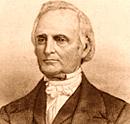 Welcome to the book by Rev. John Rankin, Letters on American Slavery (1823-1833-1839).
Welcome to the book by Rev. John Rankin, Letters on American Slavery (1823-1833-1839).
To go at once to the "Table of Contents," click here. Prior to the 1861-1865 War, there were a number of Christian abolitionists who opposed slavery. They included Rev. George B. Cheever, Harriet B. Stowe, Rev. John G. Fee, Rev. Theodore D. Weld, Rev. Stephen S. Foster, Deacon James Birney, Rev. William W. Patton, Rev. Beriah Green, Rev. Parker Pillsbury, etc. Nowadays, their Bible-based reasons are generally unknown. Other abolitionists wrote to show the unconstitutionality of slavery. They included: James Otis (1761), John Adams (pre-1776), Samuel May (1836), Salmon P. Chase (1837), Gerrit Smith (1839), George Mellen (1841), Alvan Stewart (1845), Lysander Spooner (1845), Benjamin Shaw (1846), Horace Mann (1849), Joel Tiffany (1849), William Goodell (1852), Abraham Lincoln (1854), Edward C. Rogers (1855), and Frederick Douglass (1860). This series of websites educates by making the text of their writings accessible. Whether or not you agree with their position, it is at least a good idea to know what it was! This site in the series reprints the named book by Rev. John Rankin (1793-1886), pastor of the Presbyterian churches of Ripley and Strait-Creek, Brown County, Ohio, specifically, the fifth edition of 1839. The Ohio area of Rev. Rankin's activism was near the Kentucky border. His farmsite (with a tall lighthouse) was visible for miles, including some distance into Kentucky. Rev. Rankin was a devout, kindly, compassionate man, who had emigrated north out of pro-slavery Tennesseee, had a long record of activism, and is recognized in Ohio history for it. Rev. Rankin was not only a writer 1820's on. He was also an activist, a participant, a "rescuer." He actively participated in the "Underground Railroad." This meant that freedom-seeking slaves escaping North from Kentucky could find his farmsite, be welcomed, and be passed on further North into freedom, where the U.S. Constitution was respected in this regard. Activism (even for Bible and Constitutional principles, even for merely teaching slaves to read and write) then was dangerous. Slavers might lynch, murder, them. Some abolitionists, e.g., Rev. Elijah P. Lovejoy were murdered. Rev. Rankin was lucky in 1841, to win a gun-battle against pro-slavery attackers from Kentucky. In addition to being contrary to the Bible, as Rankin and others showed, slavery also violated the U.S. Constitution. Adhering to both, Rankin thus functioned, in law, as a "rescuer" and "Private Attorney General." Rev. Rankin wrote on the rescue doctrine, p 101, infra, in context of the "original grant," p 100. Here now is the text of Rev. Rankin's book. |
Letters on American Slavery
Addressed to Mr. Thomas Rankin,
Merchant at Middlebrook,
Augusta County, Virginia,
by
Rev. John Rankin
(Ohio, 1823; Boston: Garrison & Knapp, 1833;
Newburyport: Charles Whipple, 1837;
Isaac Knapp, 5th ed., 1839;
and NUP, 1970)
| Preface | iii
| I. Rebutting Prejudice | 5
| 6
| 10
| 12
| II. Slavery Not Intended by the Creator | 14
| III. Evils of Slavery | 19
| 19
| 21
| 21
| 24
| IV. Denial of Education | 25
| 26
| 28
| V. Injustice and Cruelty | 31
| 32
| 34
| VI. Power of Slavers | 36
| 37
| 38
| 40
| VII. Power of Slavers, More Details | 43
| 43
| 45
| 48
| VIII. Cruelty of Punishments | 49
| 52
| 57
| IX. Inhumane | 60
| 60
| 61
| 62
| 63
| 64
| 65
| 66
| 67
| 67
| X. The Title Issue | 70
| XI. Prohibited by the Bible | 73
| 73
| 76
| 79
| XII. Rebutting the "Servant" Claim | 83
| 83
| 87
| 91
| XIII. Bible Anti-Southern Slavery | 94 |
94
| 97
| 101
| 101
| 102
| Excuses for Slavery | 104 |
104
| 104
| 104
| |